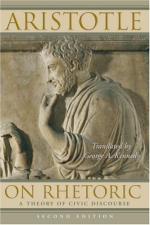
|
| Name: _________________________ | Period: ___________________ |
This quiz consists of 5 multiple choice and 5 short answer questions through Book I, Chapters 10-15.
Multiple Choice Questions
1. As explained by Aristotle, what comprised good?
(a) Only one main thing.
(b) A few different things.
(c) Many different things.
(d) Only two main things.
2. According to Aristotle, how could a person defend their position in the future when they discovered the truth of a question?
(a) Less precisely.
(b) Less forcefully.
(c) More precisely.
(d) More forcefully.
3. According to Aristotle, what was the most basic cause of pleasure?
(a) Some kind of action in accordance with one's nature.
(b) Some kind of action in accordance with one's abilities.
(c) Some kind of action in accordance with one's instincts.
(d) Some kind of action in accordance with one's desires.
4. Which one of the following assessments did Aristotle use to support his analysis in Book I, Chapter 7?
(a) Some things are different than others.
(b) Some things are similar to others.
(c) Some things are better than others.
(d) Some things are not better than others.
5. What type of argumentation did Aristotle think the dialectic should be associated with?
(a) Proper and valid.
(b) Simple and valid.
(c) Proper, simple, and valid.
(d) Proper and simple.
Short Answer Questions
1. What description of the ethical appeal was given by Aristotle?
2. In comparison to the other appeals, how much did Aristotle think that rhetoric resembled the dialectic in the logical appeal?
3. As explained in Book I, Chapter 10, what did the general law refer to?
4. How did Aristotle differentiate between crime and punishment?
5. How did Aristotle define "the good"?
|
This section contains 355 words (approx. 2 pages at 300 words per page) |

|




